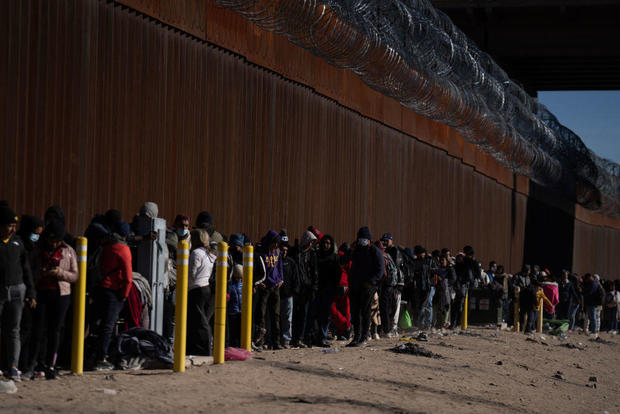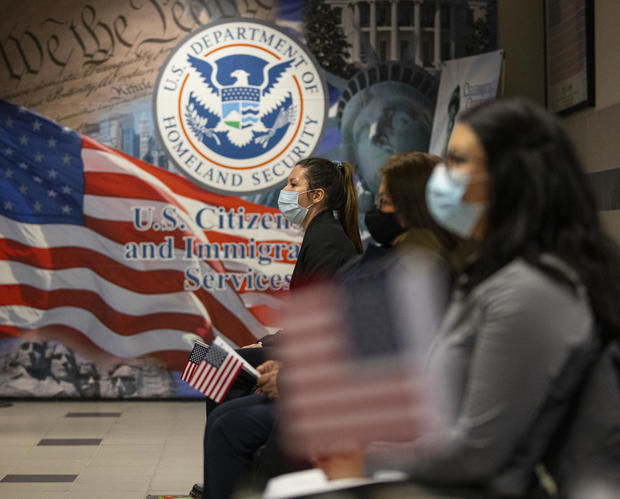Washington — The Biden administration on Tuesday proposed increasing application fees for employment-based visas and other immigration programs, in part to fund the adjudication of soaring numbers of asylum claims along the U.S.-Mexico border.
The proposed rule would also keep application fees for U.S. citizenship and humanitarian immigration benefits, such as asylum, close to or at current levels, as well as codify and expand fee waivers for low-income immigrants and other populations, such as military veterans and victims of human trafficking and other serious crimes.
U.S. Citizenship and Immigration Services (USCIS), which has historically relied on application fees, not congressional funds, to administer the nation’s sprawling legal immigration system, said the changes are necessary to ensure the agency’s finances and operations would remain stable for the foreseeable future.
The proposed changes, which will not take effect until after a 60-day public comment period is completed and a final rule is enacted, include significant fee increases for multiple employment-related immigration applications.
Under the proposed rule, applications from employers seeking to sponsor immigrants for permanent U.S. residency or temporary work visas would need to be filed with an additional $600 fee to fund the USCIS asylum program, which is responsible for screening migrants who ask for humanitarian refuge along the southern border, as well as other populations seeking U.S. asylum, such as Afghan evacuees.
Bloomberg
Unlike most USCIS programs, the asylum division needs to be funded by Congress or other programs since it doesn’t collect application fees. USCIS said it decided to attach an asylum program fee to employment-based immigration petitions because employers have “more ability to pay” higher fees. Doing so would allow USCIS to keep fee increases for other applications, such as permanent residency requests, low, the agency argued.
Under the new proposal, the application fee for H-1B visas for high-skilled workers would jump by 70% to $780. H-1B visa petitioners, many of whom are tech workers, would also need to pay $215 in pre-registration fees, up from the current $10 fee. Fees for requests to sponsor temporary agricultural and non-agricultural workers would jump above $1,000, increases of 137% and 135% from the current levels, respectively.
One of the most drastic fee increases would affect a program for wealthy immigrant investors hoping to move to the U.S. permanently. Applications for this program would soar to $11,160, a 204% spike.
U.S. citizens and permanent residents hoping to sponsor certain family members for permanent residency, also known as a green card, would also need to pay higher fees under the proposed rule. The filing fee for those applications would increase by 33% to $710. Requests from American citizens seeking to bring their fiancés to the U.S. would also increase to $720, a 35% jump.
Meanwhile, applications for green cards from immigrants already in the U.S. would increase by 35% to $1,540. The filing fee for requests to obtain U.S. citizenship would increase by $120, or 19%. Asylum applications would remain free.
In a statement Tuesday, USCIS said the fee increases for certain petitions were necessary to cover operational costs, speed up application reviews, hire additional adjudicators, sustain the asylum program and reduce the agency’s backlog of millions of pending cases. While USCIS historically updates fees every two years, the current fee structure dates back to 2016, the end of the Obama administration.
The proposed fee structure, the agency argued, would help USCIS avoid the budget crisis it dealt with in 2020. USCIS faced financial collapse and mass employee furloughs at the outset of the COVID-19 pandemic, which initially led to a suspension of in-person interviews and a sharp drop in immigration applications.
“This proposed rule allows USCIS to more fully recover operating costs for the first time in six years and will support the Administration’s effort to rebuild the legal immigration system,” USCIS Director Ur Jaddou said in a statement.
Citing the proposed rule’s fee waivers and low fee increases for certain immigration programs, USCIS said the changes would “decrease or minimally increase fees for more than one million low-income filers each year.”
/ Getty Images
While the Biden administration’s proposal would increase fees across multiple USCIS programs, it has key differences with the fee structure proposed by the Trump administration, which sought to limit legal immigration. The Trump administration’s proposal, which was struck down in federal court, sought to increase citizenship application fees by $500 and impose the first-ever charge for filing asylum requests.
USCIS said the new proposed rule would fund the expansion of a pilot program the Biden administration launched in June that aims to shorten the review of asylum claims of migrants who recently crossed the southern border from the current years-long average to several months.
The Biden administration has said the rule will allow the U.S. to better manage the record migrant arrivals along the southern border, but its implementation has so far been very limited. In fiscal year 2022, Border Patrol agents along the Mexican border stopped migrants 2.2 million times, an all-time high.
USCIS said it needs to hire an additional 2,035 officers to expand the expedited asylum program, as well as to implement the Biden administration’s lofty goal of resettling up to 125,000 refugees in fiscal year 2023.
Stephen Yale-Loehr, a Cornell University professor who studies the U.S. immigration system, said the proposed fee structure could face legal challenges from companies upset with the fee hikes for work-related immigration applications.
“The USCIS needs more money to help dig itself out of a massive backlog and to modernize its technology,” Yale-Loehr said. “But it might not legally be able to force employers to pay for asylum-related costs. Employers might sue to block some of the new fee increases if they don’t seem justified.”


